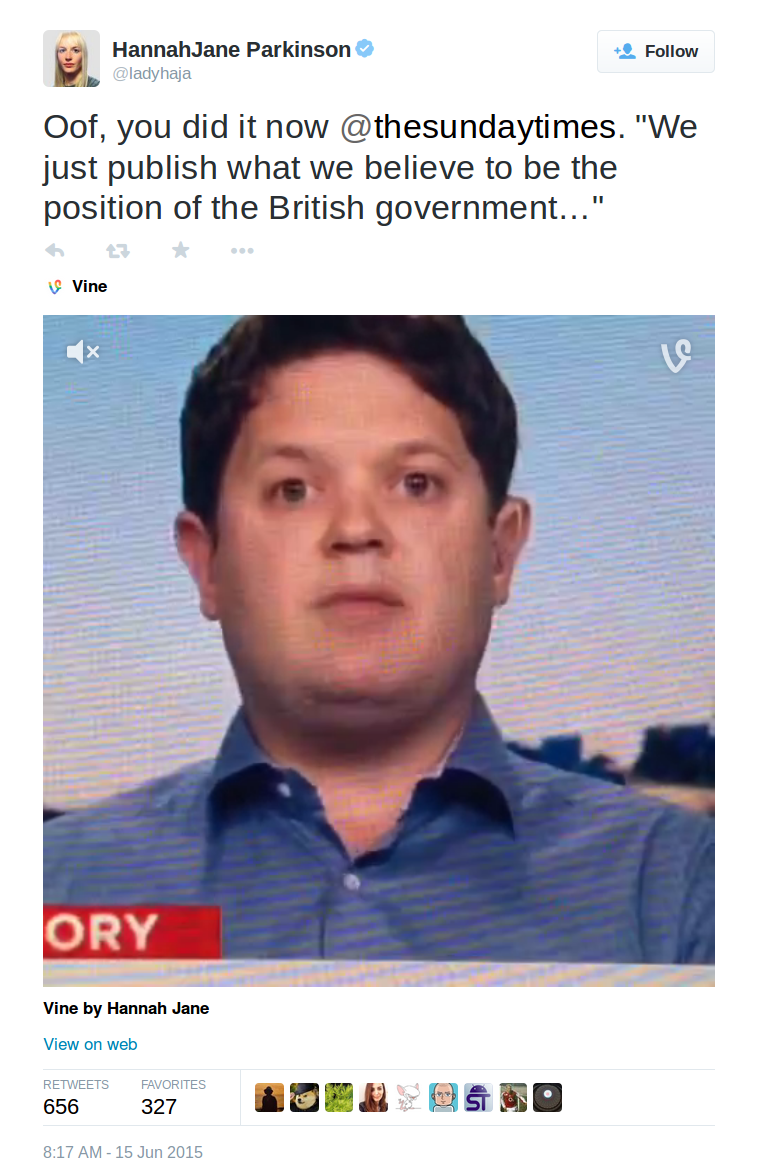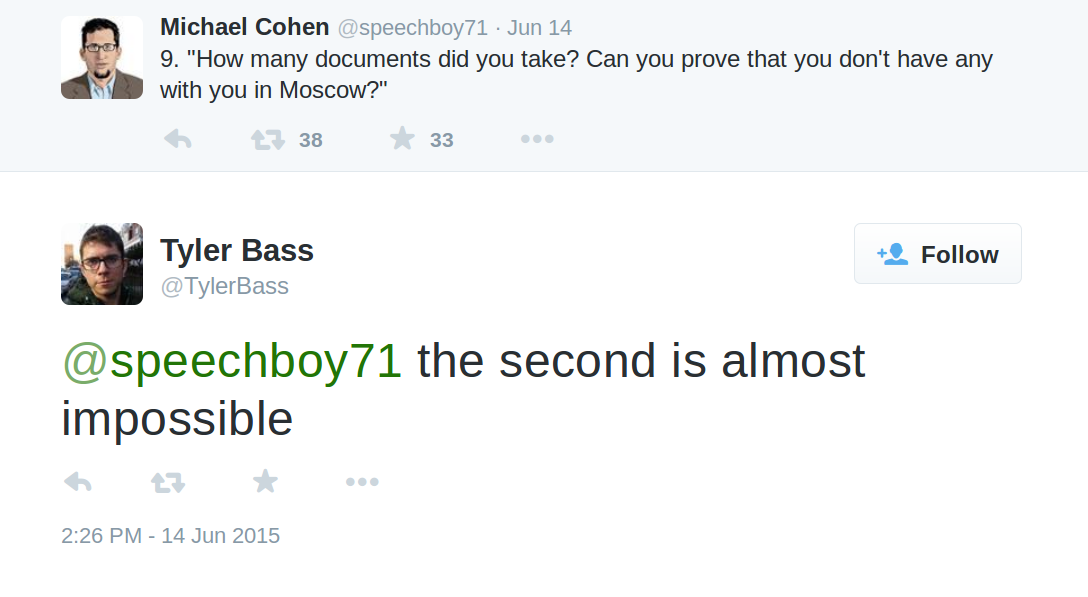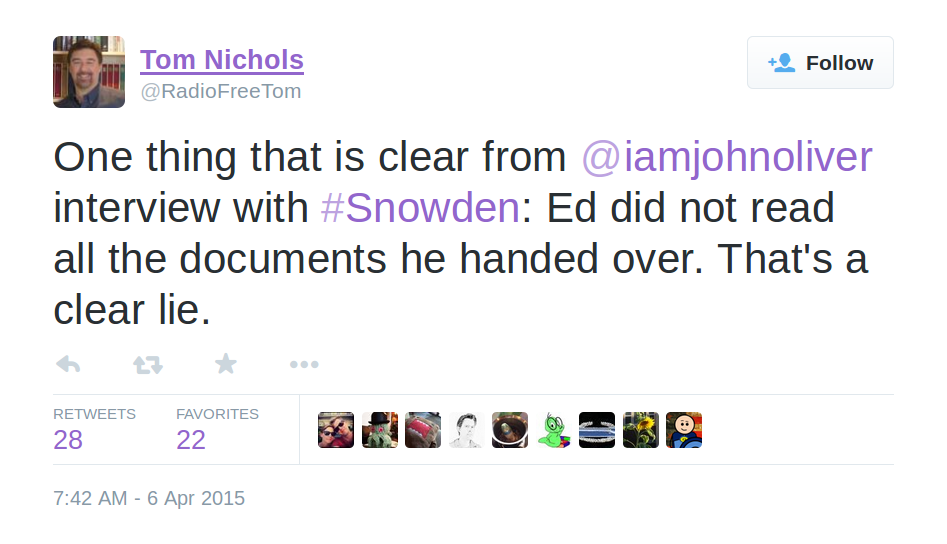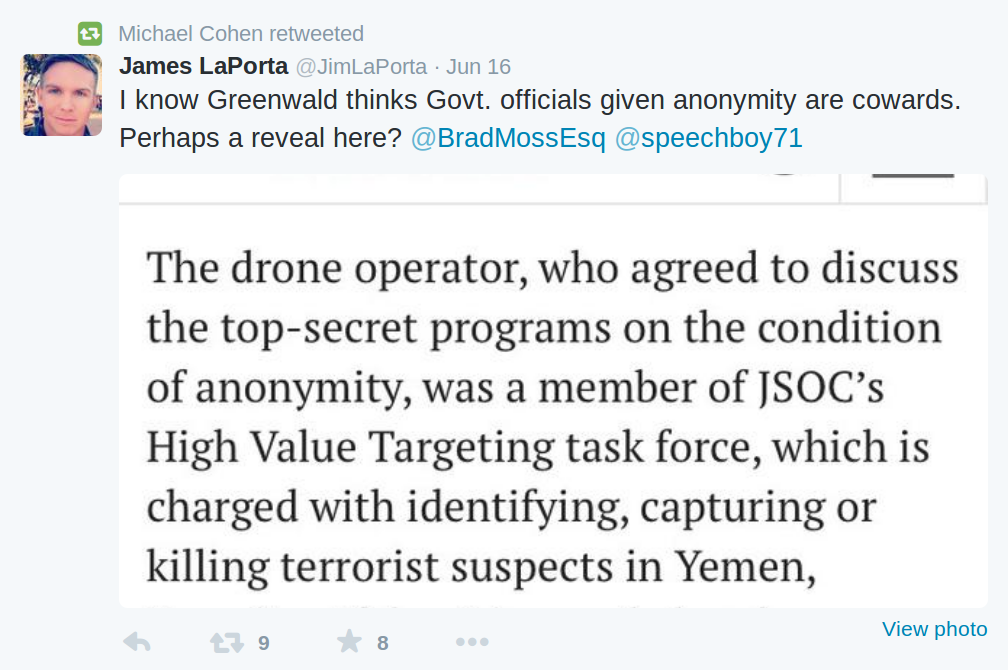With the Sunday Times Snowden smear completely, utterly and thoroughly debunked, notably if not inadvertently by the journalist and editor themselves, it is time to move on to some of the logical fallacies and prevailing attitudes that continue to support the (albeit-dwindling) anti-Snowden sentiment lingering among certain political hangers-on.
While there were a number of humble apologies made in the Twittersphere and eventually, a “correction“, the most stubborn of establishment sycophants seem determined to press their case.
In particular, the below 15-point Twitter diatribe by columnist Michael Cohen was unmissable and he raised a number of easily dispellable falsehoods that less astute observers appear to have fallen victim to. Let’s take a closer look.
Given that the journalist himself openly stated that that’s precisely what they were doing. it is Cohen’s tweet that is absurd, rather than Greenwald’s theorum.
But what about that Vine. The journalist says, direct quote:
We just publish what we believe to be the position of the British Government – Tom Harper, Sunday Times journalist
There we have it. Straight from the horse’s mouth.
Many national security reporters, analysts and correspondents have far closer, more incestuous and uncritical relationships with the security state that they are supposed to investigate. Public relations executives have invaded the management structure of major print publications and the public relations industry has grown while journalism as a whole has atrophied. State corruption of mainstream media dates back at least half a century.
What Michael Cohen is really accusing Glenn Greenwald of is loyalty to his source, national security whistle-blower Edward Snowden; an accusation which conversely espouses a disloyalty to the establishment which seeks to manipulate public discourse in favour of government policies – policies which include pervasive secrecy and the withholding of information in the public interest from the public arena.
Greenwald’s adversarial role is precisely what real journalism is about. His loyalty absolutely should be with his well-respected and internationally-renowned source, whose veracity and historic significance are long-since established, rather than with Democrat or Republican party lines trumpeted by those with a financial and political interest in the continuation of the status quo.
 Glenn Greenwald has been very open from the outset about the interrogation that went into vetting Snowden. Quoting from Greenwald’s interview with PBS’s Frontline:
Glenn Greenwald has been very open from the outset about the interrogation that went into vetting Snowden. Quoting from Greenwald’s interview with PBS’s Frontline:
Having been a lawyer before I was a journalist, and having been a litigator, and therefore having taken a lot of depositions, the purpose of which is to take somebody’s story and just break it down through hours of relentless questioning, where you just ask them similar questions but from different angles and different contexts to ask how reliable those claims are, because if somebody is lying, that process will usually ultimately reveal that, I decided to use those tactics, because I had to be 100 percent certain that I kicked the tires as hard as I could on his story.
The hotel room was relatively small. He sat on his bed. I sat on a chair, probably three feet away from him, maybe four or five feet, and I just looked at him, and I just asked him one question after the next. He didn’t go to the bathroom. He didn’t eat. He didn’t stop and have water. It was really a very rigorous interrogation. I think he later said that it was much more intense than debriefing sessions that he had at the CIA.
I wanted it to be that way by design, because I felt confident that if there was some mendacity or deceit or something scripted, that I would be able to discover it through that process. By the end of that five or six hours, I had zero doubt that he was completely real.
Greenwald went on to spend a further two weeks interviewing Snowden in Hong Kong, and countless hours since. This hardly seems like ‘publishing Snowden’s statements at face value’. Given the origin of the materials Snowden leaked, much of what he says isn’t even a matter of opinion, but a matter of provable fact.
To complain that Greenwald has subsequently become an advocate for Snowden is to ignore the rest of the political landscape and both paid and informal advocacy occurring on all sides. The President of the United States has a Press Secretary, who advocates for and articulates White House positions to the press. Corporations have lobbyists, who advocate for and articulate the positions of big business, to politicians. Politicians have public relation teams, who advocate for and advise them.
Until the launch of the Courage Foundation, whistle-blowers really had very little direct advocacy support. There was some measure of legal support, and limited if any direct governmental support. What is so offensive about journalists who advocate for the weak against the strong? I doubt it’s offensive at all, but rather the impact they are having is growing to be so huge that it is minimising the effectiveness of the disinformation campaigns run by their opponents.
No one, least of all Snowden himself, could have imagined the international sensation he would grow to become. All and sundry expected his fate to be much different. That the advocacy work undertaken on his behalf by his supporters has been achieving spectacular results seems to have provoked some professional jealousy from a political quarter who are used to controlling the media narratives themselves – a quarter that is being displaced by the rising groundswell of public opinion set against them.
The keystone of journalism is access. Access is forming and maintaining a close connection to a source or subject. Those who have access are fundamental to shaping the public narrative. For a mainstream political columnist to suggest this is an unusual arrangement is rather precious. Who does Michael Cohen think should be shaping the narrative? People who don’t have access or who have an alternate agenda? Like Snowden’s opponents? Or who have no moral investment, no stake in the outcome and no clue? Like these guys?
Cohen must know all about access. His timeline is full of Jeb Bush this, Hilary Clinton that. Campaign agendas are all about access. From fundraising to policy announcements to interviews. As a columnist for the Boston Globe, World Politics Review and the London Observer as well as an avid follower of mainstream political campaigns, surely Cohen understands full well the necessity, import and impact of access.
All media eats at Snowden’s table, regardless of whether they are pro-Snowden or anti-Snowden. The entire international media has been profiting off him for the last two years. They ALL have a financial stake in him, one way or the other. He has been the single largest recurring news story in memory, both for organisations and freelancers.
To that end, why should anyone for whom Snowden represents a meal ticket be trusted?
Beneficiaries can be divided into three groups:
* Those who take risks to support Snowden against the full weight of the state and get paid for it
* Those who take risks to support Snowden against the full weight of the state and don’t get paid for it
* Those who kick the shit out of Snowden and get paid for it, while getting kudos (if not additional funding) from the security state for doing so.
No points for guessing which group is the most heavily populated by the affluent, predominantly white cis male, dinosaurs of conventional media.
There is no greater irony than when those who would proclaim themselves the least inclined to put stock in conspiracy theories, begin inventing their own. At this point, Cohen launches headlong into supposition and innuendo.
Rather than playing Pin The Tail On Edward Snowden, Cohen could remove his blindfold with some simple research – reading Greenwald’s ‘No Place To Hide‘ would be a great start, as would watching Sarah Harrison and Julian Assange’s interviews about Snowden’s transition from Hong Kong to Russia.
In doing so he would realise that Snowden didn’t choose to be exiled in Russia, but was stranded there by the American government when it revoked his passport, presumably for exactly this reason – leaving him in Russia bereft of travel documentation created an easy opportunity to smear him as somehow being improperly affiliated with the Russians. And smear him they have, as Julian Assange explains clearly in this interview with Democracy Now. Julian’s answer is prefaced by a clip of Hillary Clinton leveling precisely the same accusation as Michael Cohen.
Hillary says:
Mr. Snowden took all this material, he fled to Hong Kong, he spent time with the Russians in their consulate, uh, and then he went to Moscow seeking the protection of Vladimir Putin — Hillary Clinton
Julian Assange responds:
This is sadly typical of Hillary Clinton… not even the National Security Agency accuses [Snowden] of working with the Russians. In fact, the NSA, formally in its investigation, has said that they don’t think he was working with the Russians, at least not before he left the agency. Hillary Clinton, however, tries to reshape the chronology in order to smear Edward Snowden with being a Russian spy. The actual chronology is that Edward Snowden went to Hong Kong, he then saw that the situation was very difficult, reached out to us for help, and we were intimately involved from that point on, so I know precisely myself and our staff know, what happened. We submitted 20 asylum applications on behalf of Edward Snowden, to a range of different countries… it was [Snowden’s] intent to go to Latin America… Venezuela, Nicaragua, Ecuador was also looking favourable and Bolivia offered him asylum. En route to Latin America the U.S. State Department canceled his passport, leaving him marooned in Russia, unable to catch his next flight. Which had already been booked from the very beginning. His whole path had been booked while he was in Hong Kong.
…
Hillary says that he went to the Russian consulate in Hong Kong – I don’t know about that but I’m sure that, perhaps he was looking at all different kinds of asylum options and that would have made perfect sense for anyone to do that in such a severe situation.
Hillary Clinton was of course, Secretary of State from January 2009 until February 2013, with her tenure ending just a few short months before the State Department would cancel Snowden’s passport while he attempted to transit Russia.
And that is of course, the same State Department who won’t be launching an internal investigation into Hillary Clinton’s missing emails.
Cohen’s “how long is a piece of string” argument is best answered by a commenter on the thread:
No one can prove anything in the negative. Proof is supposed to require evidence and evidence can’t be non-existent or it wouldn’t be evidence at all. What questions like these are really intended to do is to obfuscate, distract and smear. They are completely unbecoming.
As with much of Cohen’s commentary, he fails to back up his accusations with references so this point has been particularly difficult to research. Many hours of reading South China Morning Post’s Snowden archive later, and the only ‘operational info’ I’ve been able to establish that Snowden discussed with them, was wholesale spying on Chinese university students and on the SMS messages of the general population. Unless he is referring to the mention of mass surveillance being undertaken at-cable, which is a worldwide phenomenon that has been reported consistently around the globe, in many regions..
Indeed, the SCMP revelations fit perfectly with the ongoing theme of Snowden’s leaks; where the public of various countries (most of the countries in the world in fact) are spied on in by the U.S. in a wholesale fashion, without warrants or individual suspicion to justify the targeting.
Snowden’s releases have not been about military versus military – but military versus civilians: mass surveillance. To expect him to exclude Chinese civilians, or Russian civilians, or any other, just because the names of those countries are incendiary to the U.S. political mainstream, would be to expect him to discriminate on the basis of nationality, the way his government does. Yet Snowden has very much proved to be a global citizen, and clearly does not adhere to the inherently unjust principle of ‘American exceptionalism’. This does not detract from, but enhances his efficacy in the eyes of the global public.
Funnily enough, even the South China Morning Post has repeated this mainstream echo-chamber claim that Snowden somehow reversed his position about whether he had read the documents he leaked, during his interview with Last Week Tonight. Business Insider also claimed that host John Oliver had caught Snowden in a ‘lie’. Yet that itself is a lie, because the wording used by the echo chamber was never Snowden’s wording at all and the heavy editing in the segment makes it clear that whatever his real answers were, they lay on the cutting room floor.
Transcription from the relevant section of the John Oliver interview:
JO: How many of those documents have you actually read?
ES: I’ve evaluated all of the documents that are in the archive.
JO: You’ve read every single one?
ES: <edit>Well, I do understand what I turned over.
JO: <edit>There’s a difference between understanding what’s in the documents and reading what’s in the documents.
ES: <edit>I recognise the concern
JO: Right cos when you’re handing over thousands of NSA documents the last thing you want to do is read them.
ES: I think it’s fair to be concerned about, did this person do enough, were they careful enough, were they thorough
JO: Especially when you’re handling material like we know you were handling
ES: Well, in my defense, I’m not handling anything anymore, that’s been passed to the journalists and they’re using extraordinary security measures to make sure this is reported in the most responsible way.
Oliver uses the word ‘read’. Snowden immediately qualifies it with the word ‘evaluated’. The same word he had used all along. Yet in this ridiculous Business Insider article the onus is again flipped back to the word ‘read’ and a hyper-inflammatory tweet is included, to raise the drama a notch:
The outright accusation that Snowden is lying is way beyond the pale. It is clear that by his continuing use of the word ‘evaluate‘ that Snowden assessed (whether by computer script or manually) the content of the documents, likely considering their provenance, affiliation, meta-data or otherwise and then entrusted the documents to the journalists, instructing them to only publish what is in the public interest.
To try to split hairs by suggesting he should have read every single word on every single page prior to leaking it is nonsense and in the case of the “many tens of thousands of documents” Greenwald describes having received, outright impossible.
Were Last Week Tonight‘s editing not so appallingly obvious and heavy-handed, the misconception that Snowden lied may not be so easily clung to by his detractors and the content of his full answers could be known. However, the short, snappy style of the interviewer (which I wholly accept is for comedic effect) was clearly carried over to the editing of Snowden’s responses, to his detriment.
Having spent upwards of 15 hours researching this article and hundreds upon hundreds more studying and writing about Snowden’s releases “on my own”, I’m pretty sure I qualify. As with many others who are intrigued by the revelations, I have turned every possibility in my mind over, and over again, while reading, watching and analysing everything that is available in the public sphere.
Ultimately, what convinces me of Snowden’s authenticity is not his supporters but his detractors. They run the exact same establishment ‘deny, degrade, distract, disrupt, destroy‘ playbook against him that his revelations showed are being used against every other significant activist or political opponent in the Five Eyes. This in itself demonstrates how much of a threat he is perceived to be. The voraciousness with which he is attacked by sock puppet accounts and the uniformity of the disparagements they make about him is telling, as is the cast of characters trotted out to discredit him. Cheney. Clinton. Hayden. Current and past directors of this, that and the other agency including proponents of the Iraq war; the disinformation dinosaurs. As usual, the issues are interlinked. The arbiters of American exceptionalism and international economic exploitation detest Snowden and everything he stands for, which, when assessing his credibility, weighs heavily in his favour.
Even if they were trying to protect Snowden and/or their images – how is this any different to the journalists who try to shield the U.S. government from scrutiny, and thus protect their own images? I’ll tell you how – because they are protecting a vulnerable whistle-blower in an unprecedented situation, rather than protecting the behemoth, colossal machine of war, economic bullying and austerity, racism, colonisation and Empire of the U.S. Government and the world is a better place for it. Those who get paid defending empire are hypocrites when finger-pointing at those who get paid to confront it.
There is a vast difference. Journalists who protect vulnerable sources, at great personal risk, cannot be equated with journalists who seek to protect their own government and in doing so uphold cushy, privileged lifestyles and self-justify their positions.
No. What is an incredible insult to a journalist is having a pro-government shill boast that they would like to write a defense of the journalist being droned to death. Or to have a journalist write an article about all the ways in which their pro-government military sources would like to murder a whistle-blower.
If being called a stenographer hurts your feelings, perhaps it is time to walk a mile in a whistleblower’s shoes before casting judgement.
Finally, one more fallacious argument amplified by Cohen:
Anonymity is not the problem. The motivation for acquiring the anonymity and the institution benefiting from it is the problem, alongside the willingness of the media outlet to provide it when it is aware that the source has a personal interest in propagating opinions which are of direct benefit to their employers; sources for which there is a clear financial and social gain.
Which is diametrically opposed to the motivations of Edward Snowden, as evidenced in the very same John Oliver interview.
JO: So, did you do this to solve a problem?
ES: I did this to give the American people the chance to decide for themselves, the type of Government that they want to have. That is a conversation that I think the American people deserve to decide.
JO: There is no doubt it is a critical conversation…
…and it’s one that without Edward Snowden, we may never have had.
Written by Suzie Dawson
Twitter: @Suzi3D
Official Website: suzi3d.com


















Debunking The Dinosaurs: Dismantling #Snowden’s Detractors https://t.co/lEe69iFJRj by Suzi3D Without Snowden, how would the people know?
Debunking The Dinosaurs: Dismantling Snowden’s Detractors https://t.co/IR87ipTPbO
Debunking The Dinosaurs: Dismantling #Snowden’s Detractors https://t.co/lEe69iFJRj by Suzi3D Without Snowden, how would the people know? W…
RT @contraspin: Debunking The Dinosaurs: Dismantling #Snowden’s Detractors https://t.co/IbhLuFluff by @Suzi3D
RT @contraspin: Debunking The Dinosaurs: Dismantling #Snowden’s Detractors https://t.co/IbhLuFluff by @Suzi3D
RT @contraspin: Debunking The Dinosaurs: Dismantling #Snowden’s Detractors https://t.co/IbhLuFluff by @Suzi3D
RT @contraspin: Debunking The Dinosaurs: Dismantling #Snowden’s Detractors https://t.co/IbhLuFluff by @Suzi3D
RT @contraspin: Debunking The Dinosaurs: Dismantling #Snowden’s Detractors https://t.co/IbhLuFluff by @Suzi3D
Debunking The Dinosaurs: Dismantling Snowden’s Detractors via @contraspin https://t.co/KkP6av5qOa
Well done, Ms. Dawson!
I am now on the ever-growing list of twitter accounts blocked by Michael Cohen, sensitive soul.
~
RT @Suzi3D: How the methods of #Snowden’s detractors gift him credibility, c/o @contraspin https://t.co/twcfpYfbXN http://t.co/R33KF4jFq1
RT Suzi3D: How the methods of #Snowden’s detractors gift him credibility, c/o contraspin https://t.co/iDOa9j7YI1 http://t.co/6ARuvY2KjR …
[ed twiitti] @ggreenwald tiivisti, #AmerikanEetu ‘sta voi olla montaa mieltä,mutta maailman hän muutti @SarasvuoJari https://t.co/ggdcvi2r3t
RT @Buoen: “@Suzi3D: How the methods of #Snowden’s detractors gift him credibility, c/o @contraspin https://t.co/OeAueDeSfU http://t.co/v0N…
Dismantling Snowden’s Detractors, in which @Suzi3D defenestrates @speechboy71 right down to his tightie whities: https://t.co/IlIzBXqwMN
RT @Pedinska: Dismantling Snowden’s Detractors, in which @Suzi3D defenestrates @speechboy71 right down to his tightie whities: https://t.co…
RT @Suzi3D: On access journalism in the context of criticisms of @ggreenwald & #Snowden: c/o @contraspin https://t.co/twcfpYfbXN http://t.c…
RT Suzi3D: On access journalism in the context of criticisms of ggreenwald & #Snowden: c/o contraspin https://t.co/iDOa9j7YI1 …
RT Suzi3D: On access journalism in the context of criticisms of ggreenwald & #Snowden: c/o contraspin https://t.co/iDOa9j7YI1 … Without Sn…
RT @Suzi3D: On access journalism in the context of criticisms of @ggreenwald & #Snowden: c/o @contraspin https://t.co/twcfpYfbXN http://t.c…
RT @Pedinska: Dismantling Snowden’s Detractors, in which @Suzi3D defenestrates @speechboy71 right down to his tightie whities: https://t.co…
RT @MonaHol: @JimmyJazz1968 @trill_pikachu Show needs to read this masterful take-down of Mr. Speechboy. https://t.co/TCQPkTtaQT
RT @denistegg: Debunking The Dinosaurs: Dismantling Snowden’s Detractors via @contraspin https://t.co/KkP6av5qOa
RT @mz_chief: @haloefekti @thoton #NOwar #NoNukes https://t.co/lXzMgUWnQh Debunking The Dinosaurs: Dismantling Snowden’s Detractors http://…
RT @Pedinska: Dismantling Snowden’s Detractors, in which @Suzi3D defenestrates @speechboy71 right down to his tightie whities: https://t.co…
RT @Suzi3D: On access journalism in the context of criticisms of @ggreenwald & #Snowden: c/o @contraspin https://t.co/twcfpYfbXN http://t.c…
RT @Pedinska: Dismantling Snowden’s Detractors, in which @Suzi3D defenestrates @speechboy71 right down to his tightie whities: https://t.co…
“Dismantling Snowden’s Detractors” Brilliant. More facts rebutting MSM whores & politicians https://t.co/EjtV70xhN0 http://t.co/LDgsopuaiv
RT @Pedinska: Dismantling Snowden’s Detractors, in which @Suzi3D defenestrates @speechboy71 right down to his tightie whities: https://t.co…
RT @Suzi3D: On access journalism in the context of criticisms of @ggreenwald & #Snowden: c/o @contraspin https://t.co/twcfpYfbXN http://t.c…
RT @denistegg: Debunking The Dinosaurs: Dismantling Snowden’s Detractors via @contraspin https://t.co/KkP6av5qOa
RT @denistegg: Debunking The Dinosaurs: Dismantling Snowden’s Detractors via @contraspin https://t.co/KkP6av5qOa